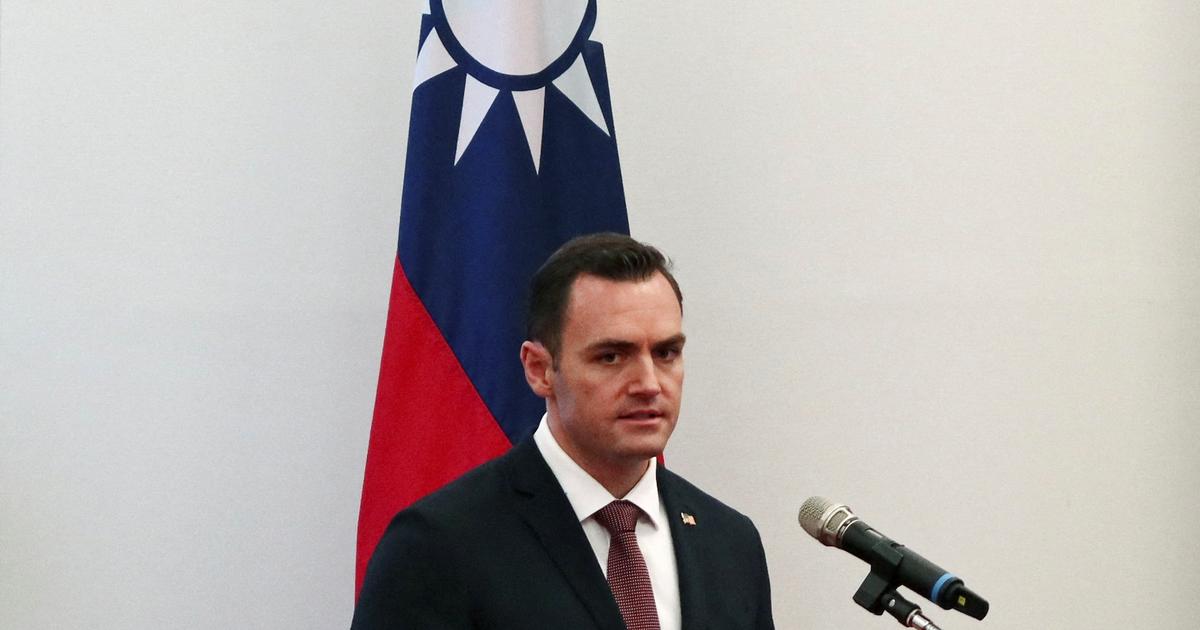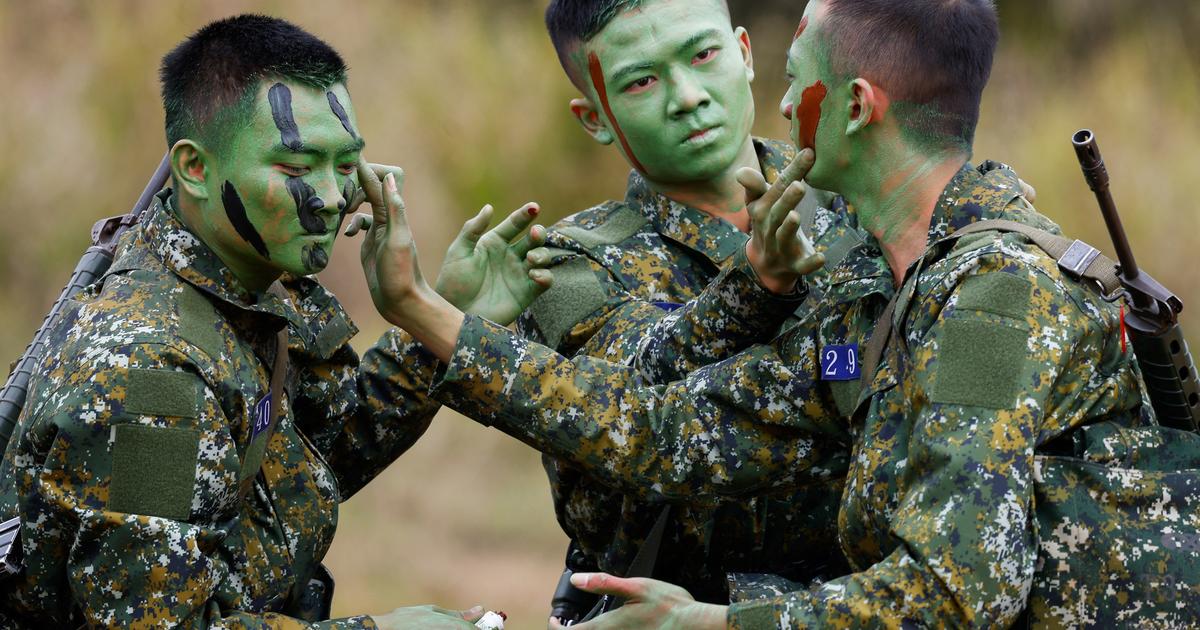TAIPEI, Taiwan – Three months after Russia invaded Ukraine, Annette Lu, the former Vice President of Taiwan, went before reporters to promote a wildly unpopular idea.
According to her, China and Taiwan should form an economically integrated
commonwealth
,
like the European Union
, but politically separate.
An S70C helicopter can be seen flying around the SS793 submarine as part of Taiwan's major annual "Han Kuang" exercises, as 20 naval vessels, including frigates and destroyers, fired shells to simulate intercepting and attacking an invading force.
REUTERS/Ann Wang/File Photo
He called it One Zhonghua, a word that means "Chinese" in a cultural, ethnic or literary sense, but is different from the word that refers to China in a political sense.
It was a nod to the Chinese Communist Party
's insistence
that there is only one China and that Taiwan is an inextricable part of it.
A Zhonghua is not a new idea.
The notion of a commonwealth or federation of independent Chinese states has been touted as a solution to the Taiwan dilemma for decades by scholars, publishers and minor officials on both sides of the strait.
fears
But when Russian troops invaded
the Ukraine
, it surfaced again.
"For the first time, the Taiwanese realized that the war is real," Andrew Hsia, vice president of the KMT opposition party in Taiwan, told me last month.
He had just returned from a rare and controversial visit to mainland China, an attempt to improve the quality of life for Taiwanese working in China and to meet the new Chinese leaders responsible for policy toward the island.
He doubted the idea of a commonwealth, but said that "any idea that can maintain the existing way of life and avoid conflict is worthy of debate."
A Zhonghua is a fantasy, of course.
Chinese President
Xi Jinping
, who considers Taiwan a rogue province, has shown no appetite for anything that would leave Taiwan's sovereignty intact.
In fact, China is expected to announce an accelerated schedule to reunify with the island by force if necessary.
Across the pond, Taiwan's president,
Tsai Ing-wen
, stands firm on the island's right to determine its own destiny and rejects anything that smacks of union with China.
Yet the quixotic
One Zhonghua
campaign gets to the heart of the unresolved riddle of what Taiwan's relationship with China should be.
According to polls, the vast majority of Taiwanese want to maintain the status quo of undeclared de facto independence.
However, in a recent survey, about 40% of Taiwanese said they wanted to improve economic relations with China, while a smaller percentage said economic ties needed to be reduced.
It is estimated that between 1 and 2 million Taiwanese - almost
10%
of the total population of the island - live and work on the mainland.
As the US-China rivalry heats up, many Taiwanese are wondering how to preserve their incredibly innovative and prosperous open society.
Should they prepare to fight like Ukraine or try to compromise to avoid conflict?
Reaction
How Taiwanese voters answer this question will determine who wins Taiwan's presidential election in January and the fate of the island's fledgling democracy.
For the ruling Democratic Progressive Party, the best way to avoid war is to strengthen ties with the United States and buy enough weapons to make China think twice before launching an invasion.
These days,
Joseph Wu,
the foreign minister, keeps prominently in his office a Ukrainian flag signed by Ukrainian soldiers, along with two pairs of boxing gloves given to him by the mayor of Kiev, Ukraine.
In December, the administration announced that it was extending the length of mandatory military service from four months to one year.
However, Taiwan is not Ukraine.
In political terms, it is not recognized by the United Nations as an independent country.
In practical terms, it's an island that would run out of natural gas in about eight days if it were ever blockaded.
The Chinese economy, despite its significant challenges, is much larger, more diverse, and more attractive than the Russian one.
On the eve of the invasion, the Russian army was about four times the size of the Ukrainian one.
Today, the Chinese military is nearly 12 times the size of Taiwan's.
Whether Taiwanese admit it or not, part of the country's prosperity has come from being the gateway to the world's biggest market.
At a nightclub in Taipei, I hung out with a concert promoter who couldn't wait to put on another event in Shanghai, where he makes more money, and a British-Nigerian rapper named Brazy who came to Taiwan to learn how to rap in Mandarin, hoping that his songs would go viral in China.
These days, a sense of uncertainty hangs over Taipei.
Almost no one I spoke to was confident that Taiwan could withstand an attack without the direct involvement of US soldiers.
Bill Stanton, a retired US diplomat who ran the US embassy in Taipei and also worked in Beijing during the Tiananmen Square massacre, told me that he had stood up to bullies as a child, which is why he stands up for Taiwan:
"They are small, it is easy to mess with them," he said.
"I think we all need to stand up for the little guy."
USA
President
Joe Biden
has pledged four times in the past year to do just that, in part because the defense of Taiwan is seen as an integral part of the defense of Japan, South Korea, and international shipping.
But US policy has been deliberately ambiguous about exactly what support the US would provide to Taiwan in the event of a crisis.
Social media accounts have flooded the island with warnings that the Americans will eventually abandon them to their fate.
There has also been a spate of arrests of suspected spies, including a Taiwanese military officer who was allegedly paid to surrender to an order.
Recently, Matt Pottinger, who was a National Security Council staffer in the Trump administration, gave a pep talk in Taipei.
"A fiery determination to defend one's homeland, family and way of life can make up for an inferior team, inferior numbers and inferior odds," he advised in a speech he delivered in Mandarin, citing lessons from Ukraine. .
"But the will must be cultivated."
For the DPP, part of that fiery determination involves redirecting trade away from China and toward Japan, Australia, New Zealand and the United States, a project known as the "Southbound" policy.
It just might work when it comes to computer chips, Taiwan's most lucrative industry.
But fish farmers and orchard owners are skeptical about substituting the Chinese market, which buys about 42% of the island's exports.
Last summer, China banned grouper and Taiwanese wax apples, prompting some farmers to change their stance.
"Of course we want an independent Taiwan," an orchard owner told Lung Ying-tai, a former culture minister.
"But at what price?
Taiwanese officials vowed to find new markets for the fish or consume it at home.
During a lavish lunch in Taipei, the vice foreign minister removed the lid from a succulent dish and declared:
"This is our freedom fish!"
Hsia, a KMT vice-chairman, told me that he called for the grouper ban to be lifted during his recent trip to China.
He described the Chinese officials' response as
cooperative
, saying that days later they received a delegation from the Taiwan fish farming association.
If China does end up lifting the ban, it would reinforce the KMT's claim that it is the party that
knows how to run China.
The KMT has long advocated economic integration with China.
The party's roots go back to the Nationalist army that lost a civil war against the Chinese communists in 1949 and escaped to Taiwan to regroup.
KMT officers, who initially ruled as a military dictatorship, were so committed to the dream of returning to mainland China for revenge that, a professor at Ming Chuan University told me, they systematically prohibited serving soldiers from marrying. , for fear that the soldiers would stray from their cause.
The closest Taiwan has ever come to One Zhonghua occurred between 2008 and 2016, under the administration of KMT Chairman Ma Ying-jeou.
Ma Ying-jeou signed a series of agreements with China, including a trade agreement that allowed many Taiwanese products to be sold in China at reduced tariffs, without giving China the same access in return.
This agreement is still in force and is considered vital to the Taiwanese economy.
But a second trade deal, focused on services, was too long a bridge.
Fearing Taiwan was getting too close to China, protesters seized the legislature building in 2014 and helped drive the KMT from power two years later in what was dubbed the Sunflower Movement.
Since the DPP won the 2016 election, it has announced changes that underscore the separateness of Taiwanese identity, reducing the size of the words "Republic of China" on passports while making the word "Taiwan" much more prominent.
The number of people who consider themselves Taiwanese has risen from 17.6% in 1992 to
60.8%
in 2022, according to Ching-hsin Yu, director of the Center for Election Studies at National Taipei Chengchi University.
Young activists are dismayed that Lu, who at the time served five years in prison under the dictatorship for trying to bring democracy to Taiwan, is selling One Zhonghua.
"Lu's proposal is very outdated," said Fei-fan Lin, a former protest leader who became deputy secretary general of the Taiwan Democratic Party (DPP) and is now a board member of the New Frontier Foundation, a group reflection of the DPP.
China's crackdown on Hong Kong beginning in 2019 dispelled any doubts that China would dismantle Taiwan's political system given the chance.
"Can Chinese nationalists (or their apologists) keep quiet about Zhonghua?" headlined an article by Brian Hioe, a chronicler of progressive activism in Taipei, in New Bloom magazine last August.
On Twitter, he has suggested that figures like Lu, now 78, need to be "put to pasture".
However, for Taiwan's older generation, the idea of being Chinese still has profound cultural power.
Lung Ying-tai, a former Minister of Culture, told me that ever since China was unified in 221 BC, many in China have harbored the idea that all Chinese should live together under the same ruler.
Those who tried to break away from the emperor never lasted long.
"In thousands of years of history, Taiwan is the first open society of Chinese people," he told me.
"It's a miracle. How we survive will be another miracle."
c.2023 The New York Times Company
look also
Faced with a possible invasion of Taiwan, the United States seals a strategic agreement and now surrounds China at sea
Entrepreneurs flee from China's heavy hand: "They don't have to stay there











